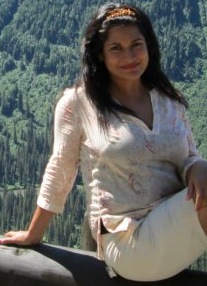 FPP spoke with Mitra about the risks and rewards of the first person plural voice, tensions with the “we” while in India on her Fulbright, and the freedom of fiction. Mitra will read with Margo Jefferson and Justin Torres at the First Person Plural Reading at AWP on Friday, March 8 in Boston.
FPP spoke with Mitra about the risks and rewards of the first person plural voice, tensions with the “we” while in India on her Fulbright, and the freedom of fiction. Mitra will read with Margo Jefferson and Justin Torres at the First Person Plural Reading at AWP on Friday, March 8 in Boston.
What are the rewards of writing in the first person plural voice? The risks? The rewards of the first person plural voice are that the author and readers, however momentarily, feel a sense of community and can experience both the beauty and immense pain of being part of that whole. The risk, I believe, is that if used irresponsibly the first person plural can become reductive and therefore problematic.
Do you ever resist collective identity, or a “we” of any sort? I know that as an Indian-American child growing up in a white suburb in Texas, I often resisted being labeled as “Indian,” a term that was often used pejoratively, associating me with the alien. However, as an adult living in India in 2008, I was more sensitive to being categorized as wholly American because I was so eager to reconnect with my culture, to reclaim aspects of my heritage that had become lost to me or suppressed over time.
What did “we” mean to you as a Fulbright Scholar in India? During my Fulbright I was struck by how I both felt a deep sense of belonging and also a strong sense of isolation. In India I felt connected to my identity in way I never had before–in my volunteer work in Kolkata with children I frequently had to communicate with the kids in Bengali, my first language but one I’d gradually become disconnected from in America. I felt an embrace and acceptance by family members I hadn’t felt in twenty years. And yet I was also very much aware of being an outsider, as a second-generation Indian American immigrant, and the class differences separating me from the vast majority of the population. Sometimes, riding inside a cab or an autorickshaw, I was painfully cognizant of how protected I was from the poverty of India. Therefore, I often felt part of a “we” but also knew that I could not identify myself as part of the masses in India battling starvation, poor health care, and exploitation.
Which genre have you found most challenging? Most rewarding? I find creative nonfiction the most challenging at times because I tend to value privacy, and therefore it is easier for me to write “truthfully” and freely when I am writing fiction. Nonfiction is immensely rewarding because it forces you to address experiences head-on, and yet it can also be daunting to write both authentically and with discretion as to protect the privacy of those dear to you. I personally find fiction the most rewarding because the act of writing a story is one of constant discovery and surprise in which I relinquish control during the drafting process, really allowing my subconscious to take over and guide the story.
What is the most urgent advice you have for emerging writers? Don’t consider writing an act separate from the rest of your life and existence. Live in a constant state of observation and wonder—reflect on and record both the joyful aspects of existence and the most challenging and alienating ones. Think of writing and reflection as a lifestyle, not as work separate from the act of living.
